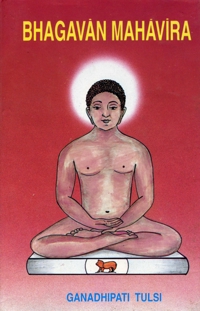| 2 | Thirty Years Of Family Life |

he spring came and began to make its presence felt everywhere. Clad in the happy and colourful garments of newborn leaves the forest trees began to stir with life. The fragrance-laden flowers filled the atmosphere with their sweet smell and the spicing breeze carried it to distant corners. The sun rose on the morning of the thirteenth day of bright half of the lunar month of Caitra in this atmosphere. Trisala gave birth to a son. It was a wonderful baby born at a wonderful moment. The mother, father and kinsmen of the child as well as Nature herself began to beam with joy. There was cheerfulness everywhere.

The birth of a child is not an accident. It is a definite link in the endless chain of destiny. It is true that newborn child comes all alone and barehanded in the world, but it is also equally true that its subtle body and mind contains infinite potentialities. It was this child who came to be known by the epithet Mahavira (i.e. a great hero) thirty years later. Nobody can aspire to become a Mahavira overnight. It takes ages to build a personality of courage and valour, and it had happened so in the case of Bhagavan Mahavira.
There is an old story. King Prajapati of Potanpur had two sons, Acala and Triprstha. One day a dance performance had been arranged in the court. The king, the princes and the courtiers watched the absorbing art of the dancers with great interest. Suddenly a visitor entered the court and disturbing the performance went straight to the king. The king suspended the performance, stood up to receive the visitor and began to listen to him.
Prince Triprstha felt offended. He enquired of his adviser inquisitively who the visitor was and how he was being given so much attention by his father. He was told that the visitor was the envoy of King Asvagrlva, the Prativasudeva, (monarch of half of the world), who was the overlord of King Prajapati. The prince was put to silence. When the envoy was about to return, the prince accosted him and said, "Mind you, don't disturb such functions in the future. This time I pardon you". The envoy pocketed the insult for the time being. But when he presented himself to his Sovereign to report on his mission, he complained against how he had been insulted by the prince. Asvagrlva was enraged and despatched another envoy to Potanpur to order Prajapati to guard the rice fields. This put Prajapati in a dilemma. He told the prince that the envoy had avenged himself for the insult meted out to him by the prince and as a result of which he had been ordered to guard the rice fields out of turn. The prince asked his father not to worry and promised to meet the Situation himself. He requested his father to depute him to the rice field.
Both the princes arrived at the rice fields with a few soldiers. The officer- in-charge of the fields told them that a lion was at large stalking the valley and entreated them to protect the farmers. Thinking it to be a long drawn out affair, Prince Triprstha decided to locale the lion immediately. Helped by the local people he arrived at the lion's den. A beat by the soldiers forced the lion out. Prince Triprstha was a daredevil and preferred to meet the lion barehanded. He jumped down from his chariot and threw away his weapons. The frantic lion rushed at Triprstha. The prince caught the jaws of the lion with both his hands and tore the beast into two like a worn out piece of cloth to the amazement of the onlookers. Then he called the officer of the forest and asked him to inform Asvagrlva that the lion had been slain and that he was now returning home.
This very Triprstha, after having gone through several cycles of births and rebirths, was born as the son of Siddhartha. His valour now found new fields of operation. It was now oriented towards Spiritual achievements. Now it was not a valour inspired by violent dispositions. It had assumed s piritual dimensions. And yet it was not an accidental change. The new orientation was the logical outcome of the sadhana performed by the soul of Triprstha in the course of numerous previous births. Let us not forget that every event has a chain of causes behind it.
 Acharya Tulsi
Acharya Tulsi

